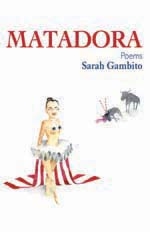|
Web Del Sol presents Sarah Gambito as a Featured Poet for 2005 National Poetry Month. The Poetry Chapbook Paloma’s Light Journal, January 2nd Paloma’s Light Journal: May 8th Paloma and I Admire the Neon Lights
"Early in Sarah Gambito’s
book, we learn that 'You cannot be in two places at once.' In fact,
the personality presented
in these poems (they are personal poems; that is to say, they have
their own unique and consistent personality) seems to have come from
Elsewhere, on the way to Everywhere."
"The
poems in Sarah Gambito's first book, Matadora, are sheer juxtapositions
of anything--star fish, Tagalog, frisson-- and the friction very
often adds a political dimension to the poetic. Lovely!" |
If you are meant to write, Paloma’s Light Journal: May 8th
There is a street in Tagaytay. Villagers lift their children on their shoulders. The children clap their hands. The sound of clapping echoes through the street in Tagaytay. Echoes through the porcelain cup she holds standing by the window. If there is time for deliberation, then there will be time for epiphany. Grains of sand clattering on the floor. Fluttering movement—a hand reaching for a hot supper, a lucid wind chime. There is a black livingroom—figures in silhouette. What they do not say is written in a red book where a violinist simultaneously composes intermezzos made of grass, of cyclical action. Going to the movies alone. Saying to the
ticket-lady, “one please . . .” is a catharsis that is a gold leaf.
Beating of the drum bleeds for the
rarest time. It occurred to him that her braid was his only friendship.
A man walking down a crowded street. He’s looking into headlights that
close his eyes, prepare him for walking down a crowded street. Sarah Gambito holds degrees from The University of Virginia (B.A.) and Brown University (M.F.A.). Her poems have appeared in The Iowa Review, The Antioch Review, The New Republic, Quarterly West, Fence and other journals. She lives in New York City. Email Sarah Gambito: sgambito@juno.com
|
This vivid, incisive, feminist debut skewers Filipina American gender roles with its delightful sense of humor. With seriocomic tone, these elliptical lyrics reveal illusions and exclusions at the heart of America’s global narrative of economic “progress,” and the attendant loss of cultural identity and memory. At the same time,Matadora challenges traditional Filipina gender norms, beginning with the title which feminizes a word and profession traditionally masculine. "....employs
a cryptic, staccato style that implies much more than meets the eye.”
"In Sarah
Gambito’s first book, a world is reborn and so to accommodate it the
speaker assumes just so many multiple elations, all of them daughters
and sisters of the things of the world. These poems fly in from other
countires. They blur the speed of prayers with alt.rock lyrics. In
the poems continents reverse themselves as if drifting in amniotic
fluid, lines of lineage re-emerge and voices in other languages adopt
themselves to various new forms of speech. The speaker arrives from
time to time. She is like snow. She takes short holidays. She smiles
at birthday cards. She can eat anything that doesn’t criticize her.
Some of her ex-lovers were not teenagers. She flits from Tagalog to
East Villagese. She has a halogen stereo and waits for 'my late great
Chachi.' She goes to clubs and raw bars and a street in Tagatay. She
tries on her butterfly kite. Through all this, she is the breathless
sum of her various accoutrements: crystal and sea-egg, a borealis,
a lamp, a holidaypipe, a Paloma, a sister. A beautiful book."
|

